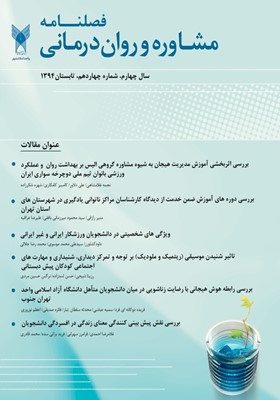بررسی رابطه هوش هیجانی با رضایت زناشویی در میان دانشجویان متأهل دانشگاه آزاد اسلامی واحد تهران جنوب
محورهای موضوعی : فصلنامه تعالی مشاوره و روان درمانی
کلید واژه: هوش هیجانی, زوجین, رضایتمندی زناشویی, دانشجویان متأهل,
چکیده مقاله :
هدف: از پژوهش حاظر به تعیین همبستگی مؤلفه های هوش هیجانی و رضایت مندی زناشویی در میان دانشجویان بوده است. روش: نمونه شامل 400 نفر از دانشجویان متأهل دانشگاه آزاد اسلامی واحد تهران جنوب در سال 1393که به صورت تصادفی انتخاب شدند. جهت اندازه گیری هوش هیجانی از پرسشنامه هوش هیجانی TMMS و برای اندازه گیری رضایت زناشویی از پرسشنامه رضایت زناشویی انریچ استفاده شد. یافته ها: نشان داد که همبستگی مثبت و معنی داری بین رضایت زناشویی و هوش هیجانی وجود دارد و 37 درصد از تغییرات رضایت زناشویی توسط هوش هیجانی تبیین می شود. همچنین نتایج تحلیل رگرسیون گام به گام نیز نشان داد مؤلفه "توجه" به عنوان مهم ترین عامل، 30 درصد از تغییرات رضایت زناشویی را تبیین نمود و همچنین پس از آن مولفه های "وضوح" و "بازسازی" به ترتیب 8% و 4% تغییرات رضایت زناشویی را تبیین کرد. همچنین نتایج نشان داد که هوش هیجانی زنان بیشتر از مردان است. نتیجه: پیشنهاد می گردد در جهت افزایش رضایت زناشویی، دوره های آموزش هوش هیجانی قبل از ازدواج برای زوجین در نظر گرفته شود تا مهارت های کنترل احساسات و در نتیجه سازگاری را بیاموزند.
Now days, marital satisfaction has been declined between the couples; whereas, couple’s communications and conception of life could play a major role in satisfaction increase. The aim of current study was determination of the correlation between emotional intelligence and marital satisfaction among university students. To this purpose, 400 married students of Islamic Azad University, South Tehran in 2014 were randomly sampled. To measuring the emotional intelligence, TMMS questionnaire was used and also Enrich questionnaire was used to measuring the marital satisfaction. The results revealed that there is a significant positive correlation between marital satisfaction and emotional intelligence and also 37% of changes in marital satisfaction is explained by emotional intelligence. The results of stepwise regression analysis showed that components of "attention" as the most important factor has explained 30% of changes in marital satisfaction an also after that, components of “clarity” and “reconstruction” could explaining 8% and 4% of changes in marital satisfaction respectively. Also the results showed that emotional intelligence of women is more than men. Given these results, it is suggested to considering emotional intelligence training course for couples before marriage, to increase them marital satisfaction.

